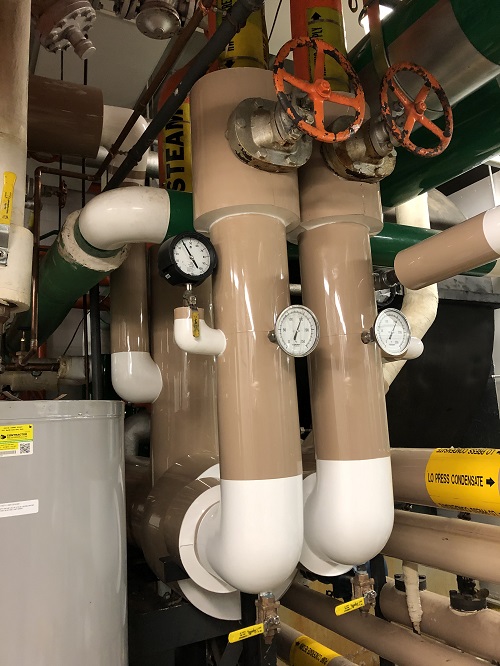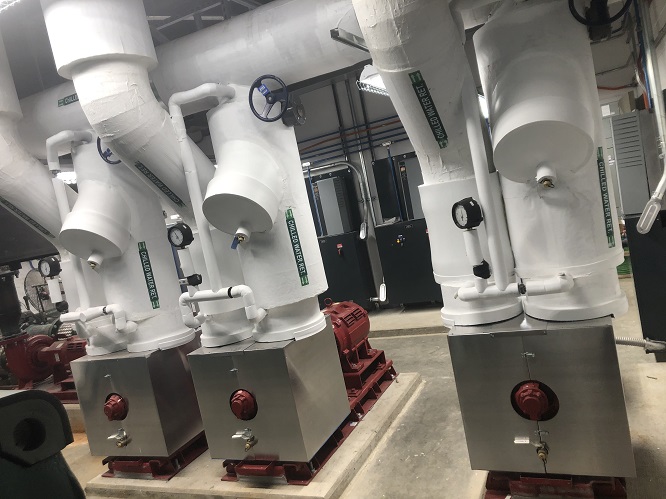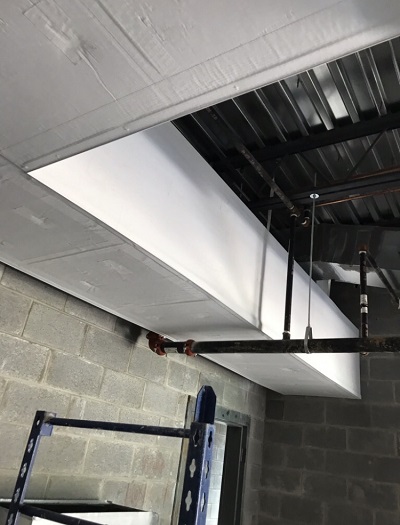The Benefits of Industrial Insulation

From power generation to food processing, insulation plays a critical role in modern industry. Insulating materials provide high returns on invested capital through energy savings, process efficiencies, and even environmental stewardship.
Let’s take a look at the far-reaching benefits of industrial insulation.
Reduce energy costs
It’s no secret that using less power saves money. Large operations can significantly reduce energy consumption by preventing waste heat loss from pipes, ducts, tanks, and valves.
According to the National Insulation Association, proper insulation maintenance and upgrades could save industrial operations $4.8 billion annually.
Insulation blocks heat energy transfer, helping save energy the moment the insulation is in place.
Heat energy is typically lost in two ways:
Conduction – Heat transfers through one solid object to another. For example, from a ceiling-mounted pipe to its metal mount.
Convection – Heat transfers via a gas or a liquid. For example, heat radiating into the air off of a hot water tank.
Industrial insulation is an investment that can pay back in as little as six months and continues to provide value year after year (especially when taking rising energy prices into account).
Improve process quality and efficiency
Applications such as chemical processing, thermoforming, or pharmaceuticals need stable temperatures to keep production quality consistent and reliable.
In the process industries, dropping below an acceptable temperature threshold can significantly affect product quality both up and downstream. Production for a sensitive product like yogurt, for example, requires maintaining a temperature high enough to allow the product to flow without getting so hot the yogurt begins to burn.
Placing insulation around processing tanks and vessels helps maintain constant temperatures, supporting optimal throughput and efficiency.
Proper insulation also improves efficiency by regulating the ambient temperature in a plant or factory. When energy radiates from ductwork or pipes, it heats the surrounding air, which can cause a plant’s indoor cooling equipment to work harder than necessary. Strategic use of industrial insulation materials supports comfortable indoor temperatures and optimal working conditions.
Enhance workplace safety
 Employees can encounter hazards such as hot piping, sub-zero equipment, or noisy machinery in an industrial environment. Insulation improves safety by shielding staff from potentially dangerous surfaces.
Employees can encounter hazards such as hot piping, sub-zero equipment, or noisy machinery in an industrial environment. Insulation improves safety by shielding staff from potentially dangerous surfaces.
“We insulated everything you see that is white in the image on the right, and we custom made all the removable silver boxes around the red pumps. All the insulation comes in hard sticks, so every 45 and 90-degree cut is custom made by our workers in the field.”
—- Preston Barshinger, Project Manager
The American Society for Testing & Materials publishes the Standard Guide for Heated System Surface Conditions that Produce Contact Burn Injuries, which contains recommendations for safe exposed-pipe surface temperatures.
At 140oF (60oC), for example, irreversible burn damage occurs after five seconds of contact with a metal surface. Insulation is vital for preventing accidental burns as well as controlling the ambient temperature that can lead to heat stress.
Industrial insulation also dampens sound, reducing the noise exposure that leads to:
- Hearing loss
- Difficulty concentrating
- Increased stress
- Increased blood pressure
OSHA addresses these hazards with its occupational noise exposure standards. For instance, a worker’s permissible exposure limit over an eight-hour day is 90 dBa. Insulation can absorb and reduce the transmission of harmful industrial noise.
Certain types of industrial insulation materials are also practical barriers against fire damage. Both fiberglass and mineral wool insulation are inherently fire resistant, meaning they will neither fuel a fire nor allow it to spread.
Promote equipment longevity
The total cost of replacing industrial equipment often adds up to more than the purchase price of a new machine because there’s the installation cost, retraining workers, possible downtime, and the disposal of old equipment to account for. Supporting equipment longevity is a critical aspect of managing industrial assets, and insulation helps.
When a machine operates on the edge of its functional boundaries (outside its optimal performance range), it wears out sooner and requires more frequent maintenance. Insulation encourages asset longevity by preventing waste heat from escaping, so the equipment can maintain ideal performance longer.
Consider an uninsulated boiler that needs to work constantly to overcome heat loss. Running at the limit of its operability stresses components and leads to frequent servicing. On the other hand, an insulated boiler (one that operates within a reasonable range) will last longer as its parts won’t require as much maintenance or repair.

Shrink environmental footprint
Today, modern industries have turned their attention towards energy conservation, with more and more operations taking responsibility for their emissions. Installing proper insulation is one of the most obvious ways to preserve power resources.
Increasing efficiency and using less fuel means fewer emissions, including harmful pollutants such as carbon monoxide, sulfur dioxide, and volatile organic compounds. By reducing energy consumption, insulation helps shrink an operation’s environmental footprint.
MultiService Industrial Insulation Experts
At MultiService Industrial, we’re experts when it comes to industrial insulation design, installation, and repair. With experience spanning multiple industries, we can help determine the best insulation material for your application.
Reach out to us to find out more about how you can take advantage of all the benefits industrial insulation provides or click below for information.